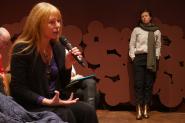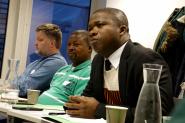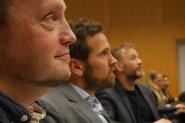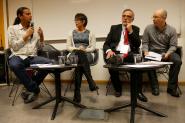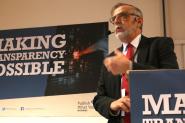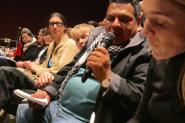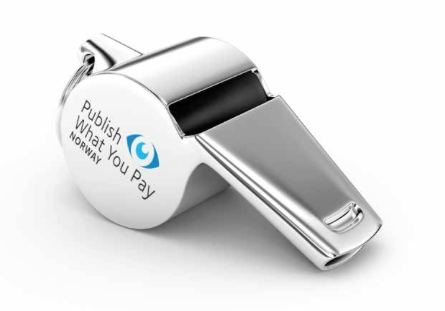En 3-dagers konferanse med 40 speakers fra 19 land.

Klikk her for å se foredragsmaterialet fra keynote speakers den 13. desember:
"How to disclose multinational corporate secrecy, corruption and tax avoidance? Investigative journalists, whistleblower, lawyers, trade union leaders."
Klikk her for å se foredragsmaterielet fra keynote speakers den 14. desember:
"What tools can nation states use when faced with systemic avoidances? Prosecutors, academics, private sector, development institutions, editors and investigative journalists."
31 foredragsholdere og paneldeltakere bidro til nye perspektiver på velkjent tematikk, med blant annet beretninger om arbeidet med Panama papers, debatter om varslere skal beskyttes eller arresteres, og historien om hvordan Ivan Velasquez antikorrupsjonsarbeide felte hele den guatemalske regjeringen.
Beskyttelsen av varslere i Norge er ikke god nok, fastslo journalist Siri Gedde-Dahl(link is external) i debatt med professor Elisabeth Eide. Journalist John Lloyd og generalsekretær i Norsk redaktørforening, Arne Jensen, diskuterte om hvordan forholdene for gravejournalistikken kan forbedres. Debatten fulgte etter Jensens innlegg om 10 bud for å øke innsynet, åpenheten og tilgangen til viktig informasjon. I salen satt Raphaël Halet, en av LuxLeaks-varslerne som risikerer mange år i fengsel for å ha lekket informasjon om Luxemburgs tilrettelegging for unndragelse av skatt.
Undersøkende journalister fra 14 land gav innsikt i hvordan mange av dem har samarbeidet transnasjonalt i store gravesaker som strekker seg over flere land. Dette har særlig blitt relevant etter store lekkasjer, slik som Panama papers, Lux Leaks og Swiss leaks. Den islandske journalisten Johannes Kristjansson delte sine erfaringer fra å stenge seg inne på en hytte i den islandske ødemarka for å uforstyrret kunne arbeide med Panama papers uten at noen fikk nyss i hva han drev med. Kristjanssons avsløringer av den islandske statsministerens private investeringer førte til at statsministeren senere gikk av. Liknende historier finner vi i Armenia, Sør-Afrika, Malaysia, Nigeria, Guatemala og Ecuador.
De store linjene ble også trukket. Økonomiprofessor Kalle Moene, jusprofessor i Beate Sjåfjell og økonomiprofessor John Andrew McNeish var blant dem som debatterte globale maktskifter, hvilken rolle folket får når de settes opp mot store multinasjonale selskaper, og hva som kan gjøres når lovverket hindrer innsyn og rett til informasjon.
Det var oppringelig planlagt å gjennomføre en 2-dagers konferanse. Etter at PWYP Norge lyktes med å samle verdensberømte gravejournalister til konferansen, var det behov for å utvide konferansen med en dag slik at gravejournalister kunne møte det norske publikum.
"The art of exposing a rich thief"
Host of the day - Prof. of Journalism Kristin Skare Orgeret, Oslo and Akershus University College of Applied Sciences (HiOA)19:00 – 19:15: Welcome: by Jan Gunnar Furuly, Chairman of SKUP Award (SKUP).
19:15 – 20:20: Journalistic investigations from three continents.
-The stories.
-Challenges and solutions along the way.
-Consequences of exposure.Journalists participating:
- Clare Rewcastle Brown, investigative reporter and founder of Sarawak Report and Radio Free Sarawak, Malaysia
- Craig McKune, investigative journalist for amaBhungane, Centre for Investigative Journlism, South Africa
- Rodrigo Veliz, investigative journalist, Guatemala
20:20 - 20:40: Break: Norwegian Christmas drink and gingerbread
20: 40- 21:10: Panama Papers: Cooperation across borders, professions and newsrooms.
Journalists participating:
- Johannes Kr. Kristjansson, investigative journalist for Reykjavik Media
- Kristine Agalaryan, investigative journalist for ww.hetq.am, Armenia
- Joshua Olufemi, investigative journalist at Premium Times Centre for Investigative Journalism, Nigeria
21:10- 21:30: Debate: When the state does not want to, or is incapable of investigating use of tax havens, and journalists are left to do the job:
- How can the conditions for investigative journalism be improved?
- Does Panama Papers signify a new era in the field of investigative journalism?
"Making Transparency Possible":
How to reveal multinational companies' tax avoidance?
Host of the day - Stig Arild Pettersen, journalist and host, Podcast "Du verden!" and "Ja, de penga"08:15 - 09:00 Registration
09:00 - 09:15 Welcome, Nina Waaler, vice-rector, Oslo and Akershus University College of Applied Sciences (HiOA), Mona Thowsen, secretary general, Publish What You Pay Norway
09:15 - 09:45 Why Transparency? Cobus de Swardt, Managing Director, Transparency International
Session 1: What is the Problem?
09:45 - 10:15 Panama Papers - an expected scandal. Prof. Dr. Juris Beate Sjåfjell, University of Oslo (UiO)
10:15 - 10:45 The art of making a corporate maze with untraceable structures and owners, PhD. Linn Anker Sørensen, University of Oslo (UiO)
10:45 - 11:15 Panel debate: What can we do when the legal and economic system prevents neccesary information and insight?
- Moderator: Prof. of Law and Economics Tina Søreide, Norwegian School of Economics (NHH)
- Prof. Dr, Juris Beate Sjåfjell, University of Oslo (UiO)
- PhD. Linn Anker Sørensen, University of Oslo (UiO)
11:15 - 12:15 Lunch
Session 2: Power Asymmetry
12:15 - 12:35 Global power shift: Companies vs. the people. Prof. of Political Economy of International Development and the Environment John Andrew McNeish, Norwegian University of Life Sciences (NMBU)
12:35 - 12:55 Why should workers care about their companies' lack of transparency? Daniel Bertossa, Director of Policy and Governance, Public Services International, the Global Union Federation
12:55 - 13:15 Inequality for all? Prof. of Economics Kalle Moene, University of Oslo (UiO)
13:15 - 14:00 Panel debate: Global powershift: Why should we care about the consequences?
- Moderator: Stig Arild Pettersen, journalist and host, Podcast "Du verden!" and "Ja, de penga"
- Prof. of Political Economy of International Development and the Environment John Andrew McNeish, Norwegian University of Life Sciences (NMBU)
- Daniel Bertossa, Director of Policy and Governance, Public Services International, the Global Union Federation
- Prof. of Economics Kalle Moene, University of Oslo (UiO)
- Roger Heimli, Norwegian Union of Municipal and General Employees (Fagforbundet)
14:00 - 14:20 Tea/Coffee
Session 3: Revelations
14:20 - 14:40 Sued by the president: the cost of exposing oil contracts in Panama, Christian Zurita Ron, investigative journalist, Ecuador
14:40 - 15:00 How can a journalist explain to the world what is going on in a tax haven? Jan Lukas Strozyk, investigative journalist who worked with Swiss Leaks, Lux Leaks, Panama Leaks, Germany
15:00 - 15:20 Why I decided to become a whistleblower in the Lux Leaks? Raphaël Halet, former accountant at PwC, Luxembourg
15:20 - 15:40 Thief or whistleblower - arrest or protect? Amélie Lefebvre, lawyer, cabinet BOURDON & FORESTIER, which represents the whistleblowers E. Snowden and A. Deltour, France
15:40 - 16:25 Panel debate: How to get access to information when more than 60% of global transactions are in the dark?
- Moderator: Assoc. Prof. Anne Hege Simonsen, Oslo and Akershus University College of Applied Sciences (HiOA)
- Christian Zurita Ron, investigative journalist, Ecuador
- Jan Lukas Strozyk, investigative journalist, Germany
- Raphaël Halet, former accountant at PwC, Luxembourg
- Amélie Lefebvre, lawyer, Bourdon & Forestier, France
"Making Transparency Possible":
What tools do governments have in their toolbox, if they want?
Host of the day - Stig Arild Pettersen, journalist and host, Podcast "Du verden!" and "Ja, de penga"08:15 - 09:00 Registration
09:00 - 09:05 Welcome, Mona Thowsen, secretary general, Publish What You Pay Norway
Session 4: Against all odds
09:05 - 09:15 Brief background on the unique case of Guatemala. Prof. of Political Science Benedicte Bull, University of Oslo (UiO)
09:15 - 10:00 Against all odds in Guatemala - a corruption case involving the highest political and military levels. Iván Velásquez, Commissioner, International Commission Against Impunity in Guatemala, (CICIG), Guatemala
10:00 - 10:30 Panel debate: How to hold a president and a vice-president accountable for corruption charges?
- Moderator: Prof. of Political Science Benedicte Bull, University of Oslo (UiO)
- Ivan Velasquez, Commissioner, CICIG, Guatemala
- Assoc. Prof. Mariel Støen, University of Oslo (UiO)
- Rodrigo Veliz, investigative journalist, Guatemala
10:30 - 11:00 Panel Debate: From Guatemala to Norway: How independent are our own control institutions?
- Moderator: Stig Arild Pettersen, journalist and host, Podcast "Du verden!" and "Ja, de penga"
- Hans Christian Holte, Director, The Norwegian Tax Administration
- Per Kristian Foss, Chairman of the Board of Auditors General, Office for the Auditor General
- Trond Eirik Schea, Director, The Norwegian National Authority for Investigation and Prosecution of Economic and Environmental Crime
11:00 - 11:20 Tea/Coffee
Session 5: Regulators' efforts after Panama Papers
11:20 - 11:45 Why is it necessary to differentiate between taxation mechanisms and transparency mechanisms? Frian Aarsnes, Director, ECON Management Consulting
11:45 - 12:10 OECD: Friend or foe in a fight for transparency? Prof. of Law and Economics Tina Søreide, Norwegian School of Economics (NHH)
12:10 - 12:35 Private sector: Friend or foe in a fight for transparnecy? Jon Vea, former ambassador to Angola, advisor at Confederation of Norwegian Enterprise (NHO)
12:35 - 13:20 Panel debate: What should Norway do to become a leader in financial transparency?
- Moderator: Turid Sylte, journalist, Vårt Land
- Jon Lomøy, Director, Norwegian Agency for Development Cooperation (Norad)
- Jon Vea, former ambassador to Angola, advisor, Confederation of Norwegian Enterprise (NHO)
- Prof. of Law and Economics Tina Søreide, Norwegian School of Economics (NHH)
- Frian Aarsnes, Director, ECON Management Consulting
13:20 - 14:20 Lunch
Session 6: The Fourth Power
14:20 - 14:40 How to be bureau chief in Russia, a country with limited access to insight? John Lloyd, contributing editor, The Financial Times
14:40 - 15:00 What to do when access to information is not given? Olesya Shmagun, investigative journalist, Russia
15:00 - 15:20 Access to information: How does it (not) work in Ethiopia? Tsedale Lemma, Editor in Chief of Addis Standard, Ethiopia
15:20 - 15:40 Which transparency mechanisms would help journlists with necessary access to information? Arne Jensen, secretary general, the Association of Norwegian Editors
15:40 - 16:25 Panel debate: What can be done to improve the conditions for investigative journalism?
- Moderator: Prof. of Journalism Roy Krøvel, Oslo and Akershus University College of Applied Sciences (HiOA)
- Prof. of Journalism Elisabeth Eide, Oslo and Akershus University College of Applied Sciences, Norwegian PEN
- John Lloyd, contributing editor, The Financial Times
- Arne Jensen, secretary general, the Association of Norwegian Editors
- Siri Gedde-Dahl, journalist, Kapital
16:25 - 16:40 Closing remarks, Jan Gunnar Furuly, Chairman, SKUP, foundation for promoting investigative journalism in Norway
16:40 - 16:45 Thank You, Mona Thowsen, secretary general, Publish What You Pay Norway
PANEL DEBATES CONFERENCE 2016 "MAKING TRANSPARENCY POSSIBLE"
Click here to see more videos of debates from the 2016 conference(link is external)
INTERVIEWS FROM THE CONFERENCE 2016: "MAKING TRANSPARENCY POSSIBLE"
Click here to see more interviews from the 2016 conference(link is external)
INVESTIGATIVE JOURNALISTS CONFERENCE 2016 ”MAKING TRANSPARENCY POSSIBLE”
KEYNOTE SPEAKERS CONFERENCE 2016: "MAKING TRANSPARENCY POSSIBLE"
Click here to see more videos from the 2016 conference(link is external)

